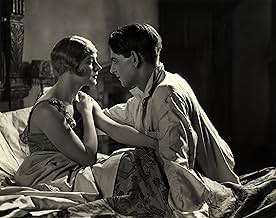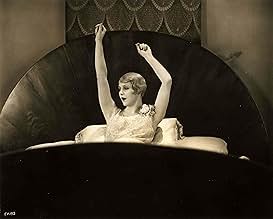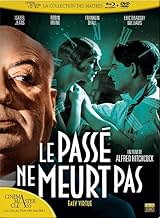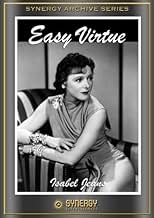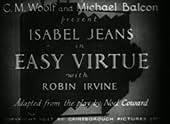IMDb RATING
5.4/10
3.3K
YOUR RATING
A recently divorced woman hides her scandalous past from her new husband and his family.A recently divorced woman hides her scandalous past from her new husband and his family.A recently divorced woman hides her scandalous past from her new husband and his family.
- Director
- Writers
- Stars
Enid Stamp-Taylor
- Sarah
- (as Enid Stamp Taylor)
Alfred Hitchcock
- Man with Stick Near Tennis Court
- (uncredited)
Benita Hume
- Telephone Receptionist
- (uncredited)
Ben Webster
- Justice Halstead
- (uncredited)
- Director
- Writers
- All cast & crew
- Production, box office & more at IMDbPro
Featured reviews
I think Easy Virtue would have worked better if we wouldn't have known Larita's background until John's family discovered it. Seeing it all laid out at the beginning of the movie removes much of the suspense. And even at only 80 minutes, the simple story feels too drawn-out.
"Easy Virtue" is an early and impressive Hitchcock in which the master displays a range of innovative filmic devices (such as the way we learn about a marriage proposal by watching the eavesdropping hotel switchboard operator rather than by seeing the man or woman talking on the phone).
The story is based on a play by Noel Coward and (contrary to the other posted IMDB comment on the film) I believe the movie is excellent. The solo organ score on the videotape I watched was absolutely stunning.
The film tackles a range of issues relating to divorce that would become taboo after adoption of the Production Code in 1934. Our heroine Larita is married to a drunken brute. After he catches her almost (but not quite) being seduced by the artist who has been painting her picture, he brings suit for divorce. Adultery is the only ground for divorce in England at this time and we see a gripping trial scene in which the jury has to decide whether to believe Larita's denials. Of course, the jury can't see beyond its Victorian preconceptions (if she's alone with him all day, of course they've slept together) and it finds her guilty.
Now a disgraced woman of "easy virtue," Larita takes to the Riviera where she ensnares a rich young suitor (after he hits her in the eye with a tennis ball). Unfortunately, she doesn't tell him about her checkered past and naturally Larita's family hates her on sight.
This story takes on a range of highly relevant divorce issues. The film skillfully lampoons the absurdity of fault divorce and the need to try questions of adultery to a jury. It takes quite seriously the way that society treated a divorced woman as damaged goods. It attacks the sexual double standard with zeal and skewers the stuffy English aristocracy to great effect. After 1934, divorce didn't exist in the movies (except in comedies where the spouses remarry in the end) and the important legal and social issues raised by divorce and female sexuality were erased from the screen by the censors. Very few early films (silent or sound) ever dealt so candidly with the harsh realities of divorce; "Easy Virtue" compares favorably to the outstanding "One More River" (1934) in its straightforward and quite moving treatment of the issues.
The story is based on a play by Noel Coward and (contrary to the other posted IMDB comment on the film) I believe the movie is excellent. The solo organ score on the videotape I watched was absolutely stunning.
The film tackles a range of issues relating to divorce that would become taboo after adoption of the Production Code in 1934. Our heroine Larita is married to a drunken brute. After he catches her almost (but not quite) being seduced by the artist who has been painting her picture, he brings suit for divorce. Adultery is the only ground for divorce in England at this time and we see a gripping trial scene in which the jury has to decide whether to believe Larita's denials. Of course, the jury can't see beyond its Victorian preconceptions (if she's alone with him all day, of course they've slept together) and it finds her guilty.
Now a disgraced woman of "easy virtue," Larita takes to the Riviera where she ensnares a rich young suitor (after he hits her in the eye with a tennis ball). Unfortunately, she doesn't tell him about her checkered past and naturally Larita's family hates her on sight.
This story takes on a range of highly relevant divorce issues. The film skillfully lampoons the absurdity of fault divorce and the need to try questions of adultery to a jury. It takes quite seriously the way that society treated a divorced woman as damaged goods. It attacks the sexual double standard with zeal and skewers the stuffy English aristocracy to great effect. After 1934, divorce didn't exist in the movies (except in comedies where the spouses remarry in the end) and the important legal and social issues raised by divorce and female sexuality were erased from the screen by the censors. Very few early films (silent or sound) ever dealt so candidly with the harsh realities of divorce; "Easy Virtue" compares favorably to the outstanding "One More River" (1934) in its straightforward and quite moving treatment of the issues.
I occasionally watch a silent film.I do find it very frustrating when actors are mouthing words and we are expected to know what they are saying without benefit of intertwines. Byou far the best part of the film is the opening trial scene.After that it is all downhill and rather silly at that.Hitchin was capable of making stinkers egg Under Capricorn,and this was clearly one of them
Easy Virtue is one of Hitchcock's interesting but not great films, that is neither among his best or worst. Not a terrible one but this is really not the master of suspense at his best. When it comes to his silent films, Easy Virtue is perhaps one of his weaker ones, with his best being The Lodger and his weakest being Champagne. It has a lot of good things. There are some very clever shots and Hitchcockian touches like in the opening courtroom scene with everything being shot like from the perspective of the judge through his monocle and the proposal over the phone showing only the reactions of the telephone operator. Hitchcock directs very well, though there is understandably the sense that he was still finding and developing his own style. The sets and costumes are lovely to watch, while Violet Farebrother plays her role with tremendous gusto and Isabel Jeans brings a lot of charm to hers. Robin Irvine is very bland though and the rest of the acting can feel rather overheated and exaggerated even with a silent melodrama. The characters do come across as stock and somewhat cardboard, there's little dimension to them and you don't really care for them either. The story is a let down, it begins brilliant and ends just as satisfyingly but there's half-an-hour at least of tedious melodrama and staid storytelling, the romance also lacks passion and you don't ever really feel the love between them. And some have made a good point about the benefits of having dialogue instead here, I have great appreciation for silent films but Easy Virtue was the sort of film being a comedy-social drama where dialogue would have helped it come alive. Overall, not terrible, not great, mixed view here if anything. 5/10 Bethany Cox
This is my first Hitchcock silent film. this film grew on me as i watched it, i thought it started out slow . but slowly developed into something very interesting. i was upset that i missed Hitch's cameo.. he's a sneaky one. this is my 4th silent film that i have watched, and this one compares almost to the other ones, but the others are classics.. phantom, Dr Jekyll, and hunchback. so this one kinda had some unfair competition. like i said before it started slow, but it quickly engrossed me after the part where she goes to his parents house to meet the family.. i thought her character was unfairly judged by his family to the point where i was glad she didn't marry him, i admired her character for standing up to the mother in that one,, what s really awful mother in law. without ruining the ending for those who haven't seen this early Hitchcock gem,, i loved the ending.
Did you know
- TriviaAlfred Hitchcock: Walking past a tennis court carrying a walking stick.
- GoofsWhile sitting with Larita after she is hit with the tennis ball, John's sitting position changes between shots.
- Quotes
[last lines]
Larita Filton: [to news photographers] Shoot! There's nothing left to kill.
- Alternate versionsThere is an Italian edition of this film on DVD, distributed by DNA Srl: "SOTTO IL CAPRICORNO (Il peccato di Lady Considine, 1949) New Widescreen Edition + FRAGILE VIRTÙ (1927)" (2 Films on a single DVD, with "Under Capricorn" in double version 1.33:1 and 1.78:1), re-edited with the contribution of film historian Riccardo Cusin. This version is also available for streaming on some platforms.
- ConnectionsFeatured in Hitchcock/Truffaut (2015)
Details
- Runtime
- 1h 20m(80 min)
- Sound mix
- Aspect ratio
- 1.33 : 1
Contribute to this page
Suggest an edit or add missing content

